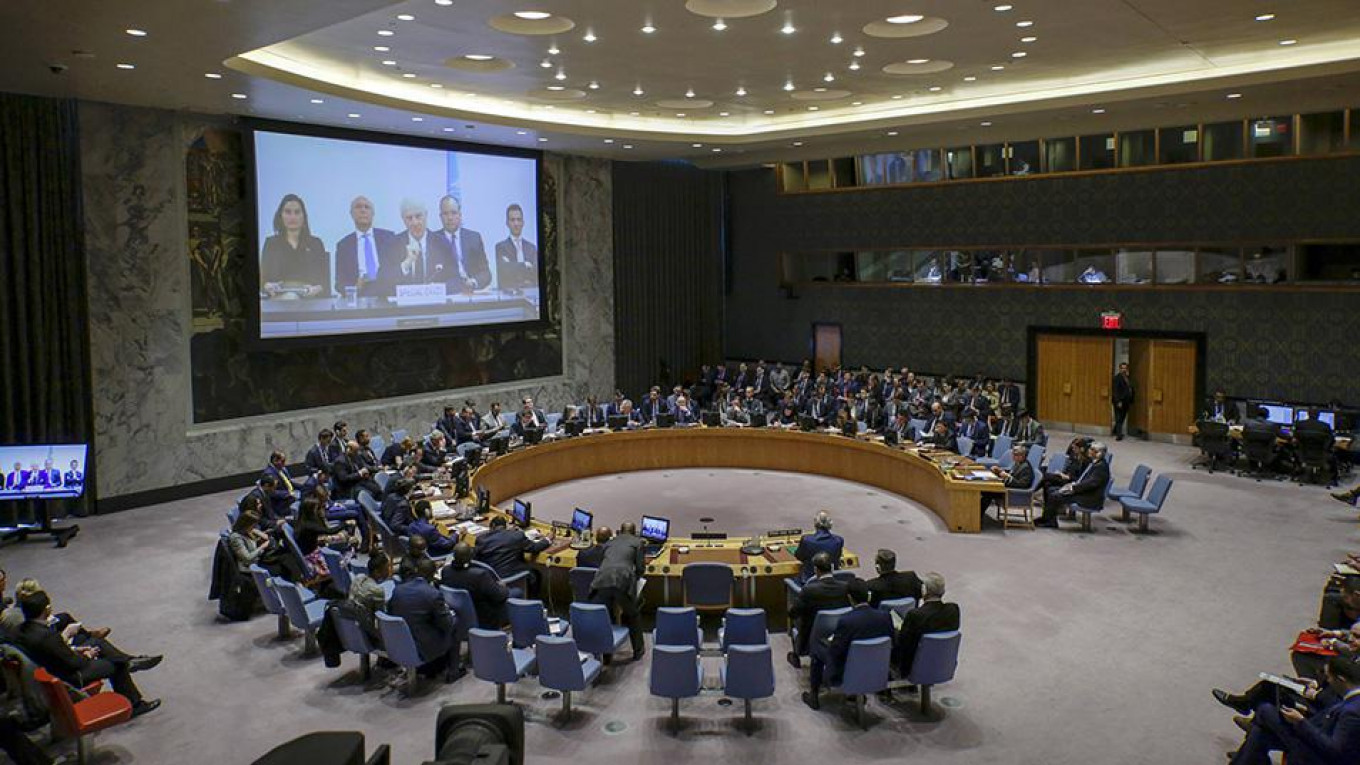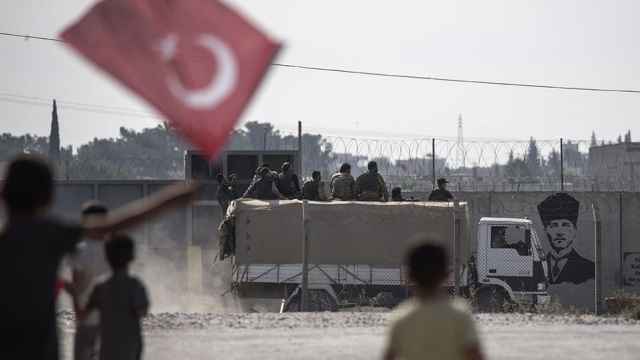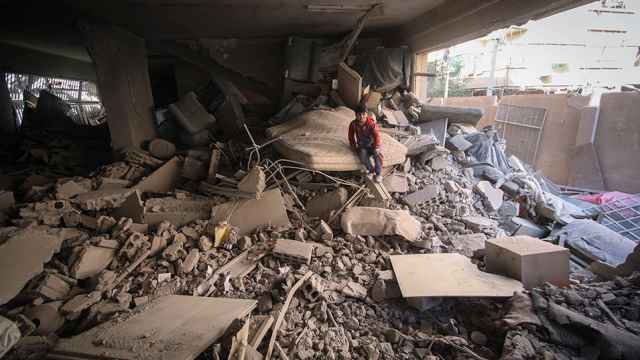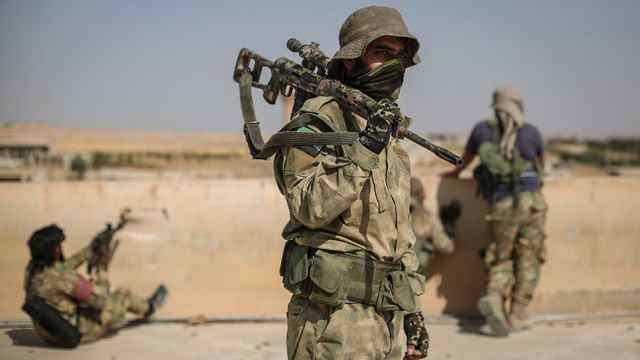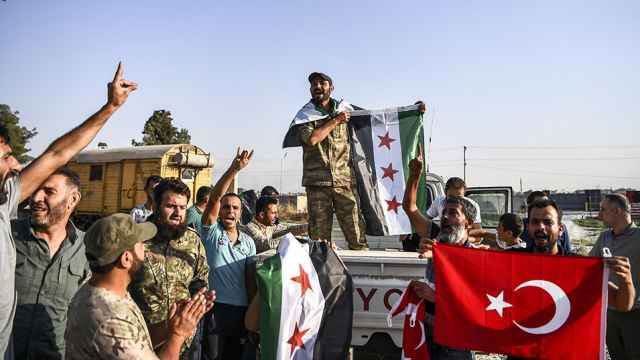Russia said on Tuesday it will propose to the United Nations that international inspectors visit the site of a suspected chemical weapons attack in the Syrian town of Douma, a move which follows U.S. President Donald Trump's warning of quick, forceful action in response to the incident.
At least 60 people were killed and more than 1,000 injured at several sites in the alleged attack on Douma, then still occupied by rebel forces, on Saturday, according to a Syrian relief group.
President Bashar al-Assad's government and Russia, his most powerful ally, said there was no evidence that a gas attack had taken place and the claim was bogus.
But the incident has thrust Syria's seven-year-old conflict back to the forefront of international concern and brought the possibility of Western military action against Assad's forces.
Further heightening the volatility, Iran, Assad's other main ally, threatened to respond to an air strike on a Syrian military base which Tehran, Damascus and Moscow have blamed on Israel.
Meanwhile on the ground, thousands of militants and their families arrived in rebel-held northwestern Syria after surrendering Douma to government forces. The evacuation deal restores Assad's control over the entire eastern Ghouta - formerly the biggest rebel bastion near Damascus.
In Moscow, Russian Foreign Minister Sergei Lavrov said on Tuesday the Kremlin would submit a resolution to the United Nations Security Council proposing that inspectors from the Organisation for the Prohibition of Chemical Weapons (OPCW) investigate the alleged attack in Douma.
Russian Deputy Foreign Minister Mikhail Bogdanov said there was no threat of the situation in Syria resulting in a military clash betweenRussia and the United States.
The state-run TASS news agency quoted Nogdanov as saying Russia and U.S. officials had "working contacts" over Syria and he believed common sense would prevail.
On Monday, Trump told a meeting of military leaders and national security advisers in Washington he would take a decision that night or shortly after on a response and that the United States had "a lot of options militarily" on Syria.
"But we can't let atrocities like we all witnessed ... we can't let that happen in our world ... especially when we're able to because of the power of the United States, the power of our country, we're able to stop it," Trump said.
At the U.N. Security Council, the United States plans to call for a vote on Tuesday for a new inquiry into responsibility for the use of chemical weapons in Syria, diplomats said.
If the U.S. proposal is put to a vote, it would likely be vetoed by Russia.
At a meeting on Monday, U.S. Ambassador to the United Nations Nikki Haley said Washington would respond to the suspected weapons attack in Syria regardless of whether the Security Council acted or not.
"This is basically a diplomatic set-up," said Richard Gowan, a U.N. expert at the European Council on Foreign Relations.
"Russia will inevitably veto the U.S. resolution criticizing Assad, and Washington will use this to justify military strikes," he said. "A breakdown at the U.N. will also make it easier for France to justify strikes."
France said on Tuesday it would respond if it was proven that Assad's forces carried out the attack. Any riposte would most likely be in coordination with the United States, government aides said.
U.S. officials told Reuters that Washington was weighing a multinational military response. Washington bombed a Syrian government air base last year over a toxic gas attack.
Russian U.N. Ambassador Vassily Nebenzia accused the United States, France and Britain of stoking international tensions by engaging in a "confrontational policy against Russia and Syria".
"Russia is being unpardonably threatened. The tone with which this is being done has gone beyond the threshold of what is acceptable, even during the Cold War."
More Clarity
Initial U.S. assessments have been unable to determine conclusively what materials were used in the attack and could not say with certainty that Assad's forces were behind it.
Trump said, however, that Washington was "getting more clarity" on who was responsible.
A previous joint inquiry of the United Nations and the OPCW had found the Syrian government used the nerve agent sarin in an April, 2017 attack and has also several times used chlorine as a weapon. Damascus blamed Islamic State militants for mustard gas use.
The suspected chemical attack came at the end of one of the deadliest Syrian government offensives of the war, with an estimated 1,700 civilians killed in eastern Ghouta in air and artillery bombardments.
Despite the international revulsion over the chemical weapons attacks, the death toll from such incidents is in the dozens, a fraction of the hundreds of thousands of combatants and civilians killed since an uprising against Assad's rule broke out in March 2011.
The deal over the rebel evacuation of Douma took effect on Sunday, hours after medical aid groups reported the suspected chemical attack
RIA news agency quoted Russia's Defence Ministry as saying 3,600 militants and their families had left Douma over the past 24 hours. About 40,000 militants and their families are expected to leave, the pro-government Watan newspaper said.
Sixty-seven buses carrying hundreds of fighters, along with family members and other civilians who did not wish to come back under Assad's rule, reached opposition areas near Aleppo on Tuesday, the Syrian Observatory for Human Rights said.
As part of the surrender deal, the Jaish al-Islam group which controlled the town released scores of people it had been holding.
Jaish al-Islam's departure will bring to an end the opposition presence in eastern Ghouta after a seven-week military offensive against the densely populated area.
The recapture of eastern Ghouta represents Assad's biggest battlefield victory over rebels since late 2016 when he took back Aleppo, and underlines his unassailable position in the war.
A Message from The Moscow Times:
Dear readers,
We are facing unprecedented challenges. Russia's Prosecutor General's Office has designated The Moscow Times as an "undesirable" organization, criminalizing our work and putting our staff at risk of prosecution. This follows our earlier unjust labeling as a "foreign agent."
These actions are direct attempts to silence independent journalism in Russia. The authorities claim our work "discredits the decisions of the Russian leadership." We see things differently: we strive to provide accurate, unbiased reporting on Russia.
We, the journalists of The Moscow Times, refuse to be silenced. But to continue our work, we need your help.
Your support, no matter how small, makes a world of difference. If you can, please support us monthly starting from just $2. It's quick to set up, and every contribution makes a significant impact.
By supporting The Moscow Times, you're defending open, independent journalism in the face of repression. Thank you for standing with us.
Remind me later.


